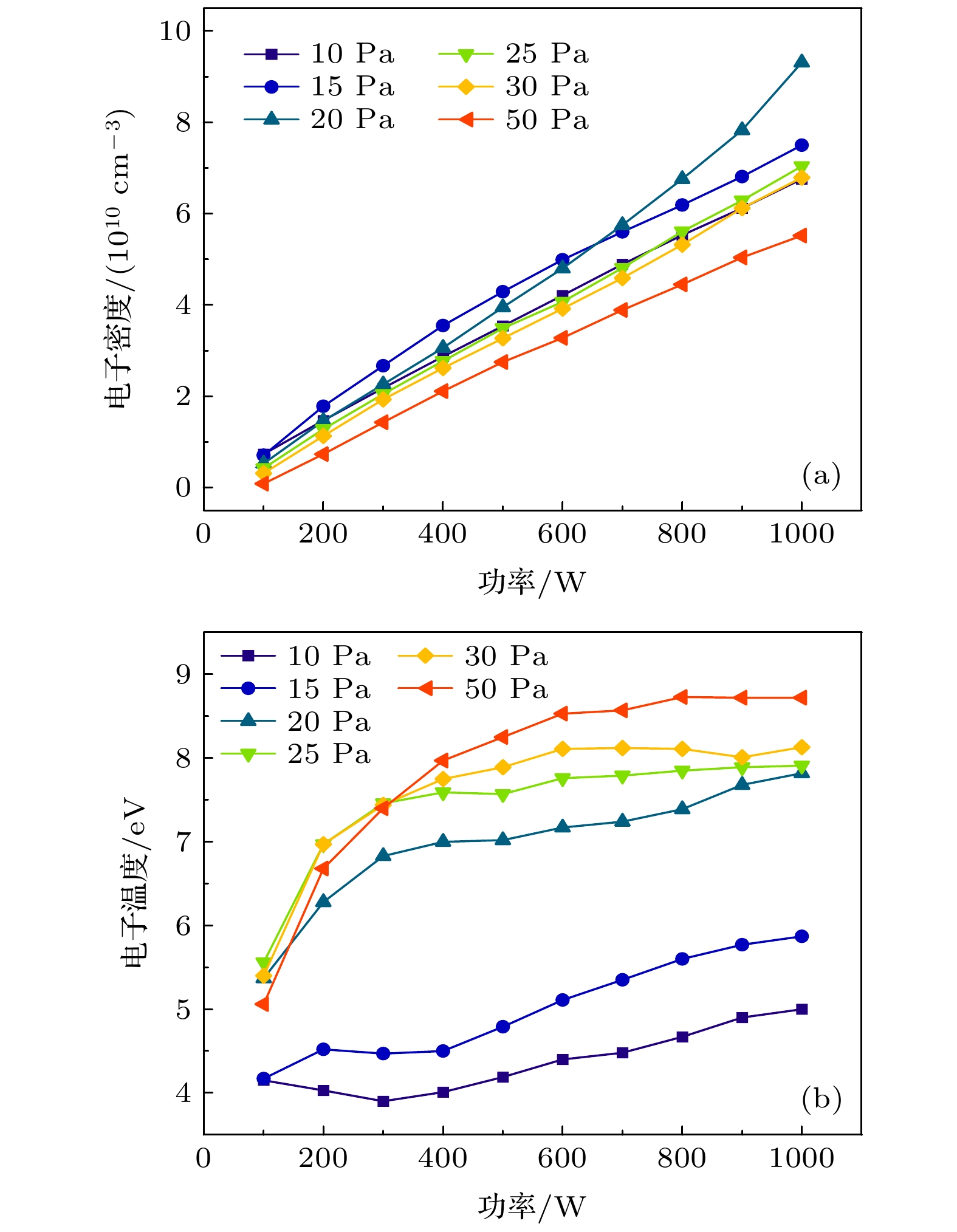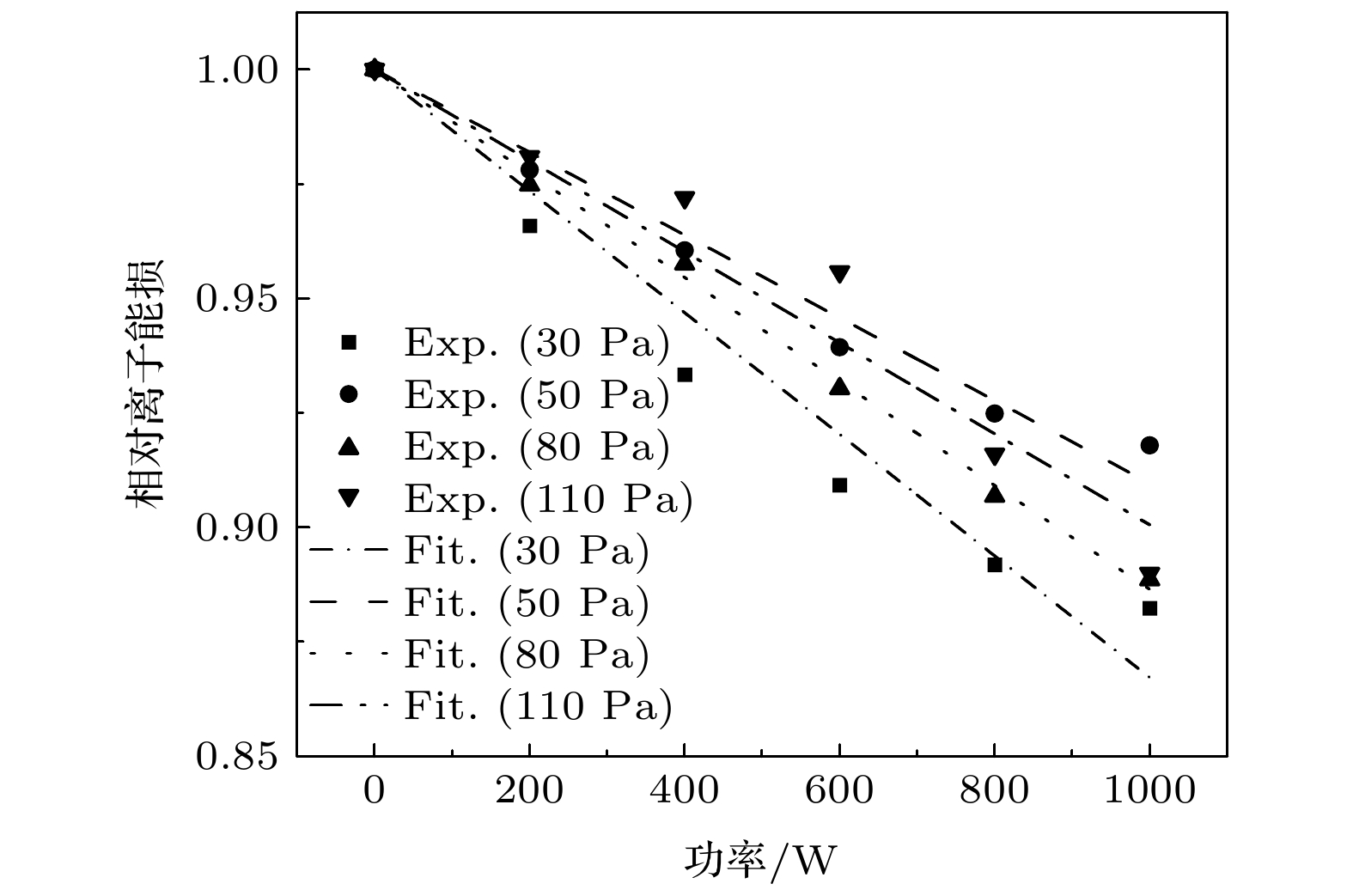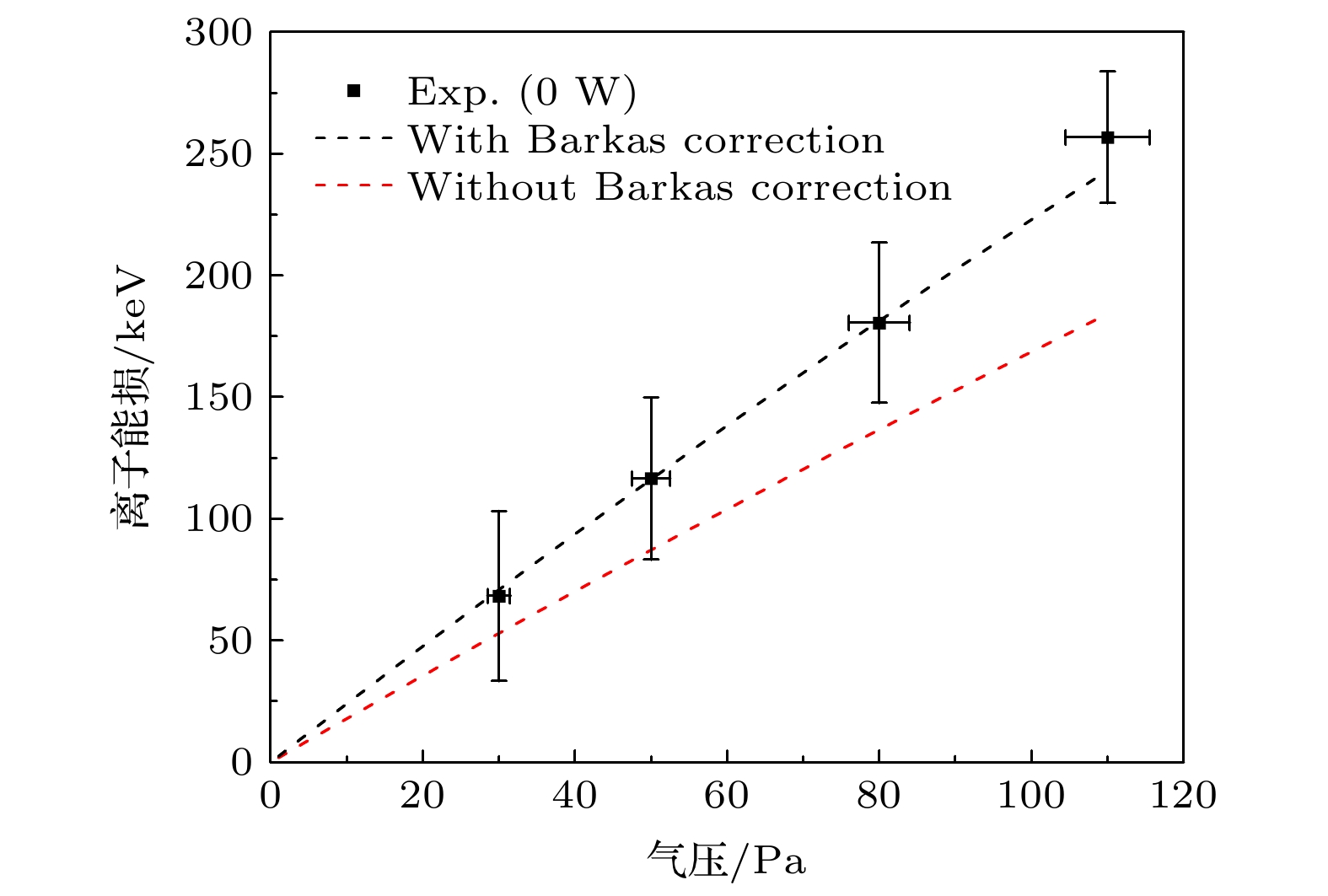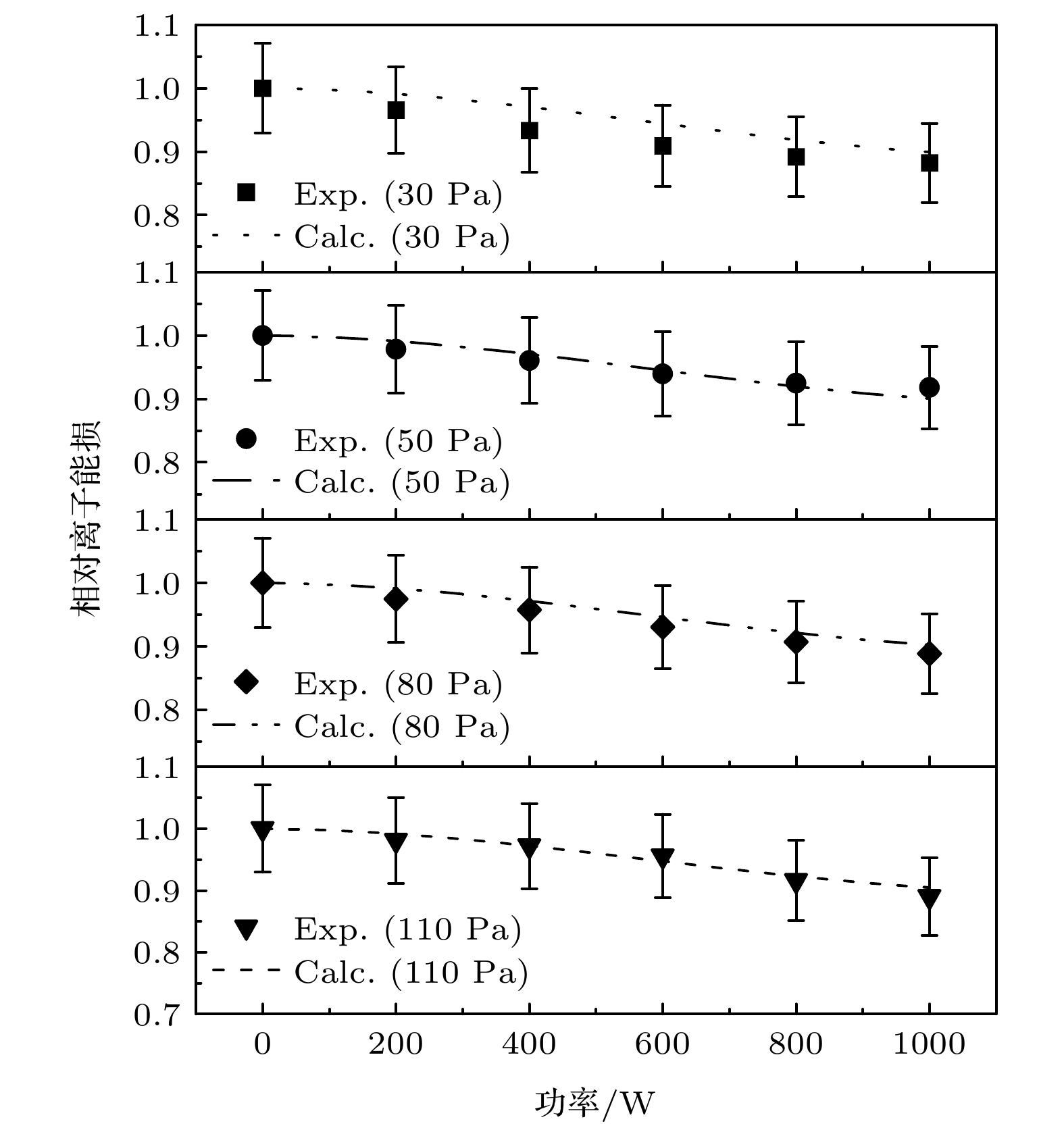-
Energy loss of ions near the Bohr velocity in plasma is one of the important topics in intense heavy ion beam driven high energy density physics and inertial confinement fusion. Based on the ions-plasma interaction experimental platform at HIRFL, this work shows the new experimental energy loss results of 1.07 MeV (~66.9 keV/u) O5+ ions penetrating through a low-density partially ionized hydrogen plasma target (radio frequency plasma). The decrease of energy loss with free electron density increasing is found, which is very different from our previous result. The new experimental results are discussed by considering the theoretical models which involves the charge screening of projectiles in the partially ionized plasma and the target polarization effect-Barkas correction term. For the charge screening , the comparison between the momentum transfer under the Coulomb potential and that under the Debye potential is given, but due to the low ionization degree, the plasma screening effect seems not to be the main reason for the decrease of energy loss. For the target polarization effect , in the Bohr velocity regime, the Barkas correction term can play a key role in the ion-atom collisions. Modeling the Barkas correction term based on the proposed classical energy loss formula, the experimental data of ions in the gas target can be well fitted by the calculated values. In the partially ionized plasma, the frequent thermal electron collisions can give rise to the atomic excitation of plasma target, correspondingly the Barkas correction term changes: it decreases with the fraction of excited atoms increasing. As a result, the energy loss decreases in our experiment. In the stopping of highly charged ions in a partially ionized low-density plasma, the collisions between ions and free electrons can produce an enhanced energy loss according to previous studies. However, the target polarization effect, especially the atomic excitations, can significantly reduce the energy loss, which is observed in our experiment. Therefore, the interaction between ions and partially ionized plasma should be further studied, and the Barkas correction can be a very important term.
-
Keywords:
- highly charged ions /
- Bohr velocity /
- low density hydrogen plasma /
- energy loss /
- Polarization effect
[1] Bohr N 1913 The London, Edinburgh, and Dublin Philosophical Magazine and Journal of Science 25 10
 Google Scholar
Google Scholar
[2] Deutsch C, Maynard G, Chabot M, Gardes D, della-negra S, Bimbot R, Rivet M-F, Fleurier C, Couillaud C, Hoffmann D, Wahl H, Weyrich K, Rosmej O N, Tahir N, Jacoby J, Ogawa M, Oguri Y, Hasegawa J, Sharkov B, Mintsev V 2010 Plasma Phys. J. 3 88
[3] Zhao Y T, Hu Z H, Cheng R, Wang Y Y, Peng H B, Golubev A, Zhang X A, Lu X, Zhang D C, Zhou X M, Wang X, Xu G, Ren J R, Li Y F, Lei Y, Sun Y B, Zhao J T, Wang T S, Wang Y N, Xiao G Q 2012 Laser Part. Beams 30 679
 Google Scholar
Google Scholar
[4] Khuyagbaatar J, Shevelko V P, Borschevsky A, Düllmann C E, Tolstikhina I Y, Yakushev A 2013 Phys. Rev. A 88 042703
 Google Scholar
Google Scholar
[5] Betz H-D 1972 Rev. Mod. Phys. 44 465
 Google Scholar
Google Scholar
[6] Peter T, Arnold R, Meyer-ter-Vehn J 1986 Phys. Rev. Lett. 57 1859
 Google Scholar
Google Scholar
[7] Cheng R, Zhou X, Wang Y, Lei Y, Chen Y, Ma X, Xiao G, Zhao Y, Ren J, Huo D, Peng H, Savin S, Gavrilin R, Roudskoy I, Golubev A 2018 Laser Part. Beams 36 98
 Google Scholar
Google Scholar
[8] Young F C, Mosher D, Stephanakis S J, Goldstein S A, Mehlhorn T A 1982 Phys. Rev. Lett. 49 549
 Google Scholar
Google Scholar
[9] Redmer R 1997 Phys. Rep. 282 35
 Google Scholar
Google Scholar
[10] Peter T, Meyer-ter-Vehn J 1991 Phys. Rev. A 43 1998
 Google Scholar
Google Scholar
[11] Thorsen J 1987 Niels Bohr Collected Works (Copenhagen: Elsevier Press) pp403-408
[12] Barkas W H, Dyer J N, Heckman H H 1963 Phys. Rev. Lett. 11 26
 Google Scholar
Google Scholar
[13] Sigmund P, Schinner A 2014 Eur. Phys. J. D 68 318
 Google Scholar
Google Scholar
[14] Adamo A, Agnello M, Balestra F, Belli G, Bendiscioli G, Bertin A, Boccaccio P, Bonazzola G C, Bressani T, Bruschi M, Bussa M P, Busso L, Calvo D, Capponi M, Cicalò C, Corradini M, Costa S, D’Antone I, De Castro S, D’Isep F, Donzella A, Falomkin I V, Fava L, Feliciello A, Ferrero L, Filippini V, Galli D, Garfagnini R, Gastaldi U, Gianotti P, Grasso A, Guaraldo C, Iazzi F, Lanaro A, Lodi Rizzini E, Lombardi M, Lucherini V, Maggiora A, Marcello S, Marconi U, Maron G, Masoni A, Massa I, Minetti B, Morando M, Montagna P, Nichitiu F, Panzieri D, Pauli G, Piccinini M, Piragino G, Poli M, Pontecorvo G B, Puddu G, Ricci R A, Rossetto E, Rotondi A, Rozhdestvensky A M, Salvini P, Santi L, Sapozhnikov M G, Semprini Cesari N, Serci S, Temnikov P, Tessaro S, Tosello F, Tretyak V I, Usai G L, Vannucci L, Vedovato G, Venturelli L, Villa M, Vitale A, Zavattini G, Zenoni A, Zoccoli A, Zosi G 1993 Phys. Rev. A 47 4517
 Google Scholar
Google Scholar
[15] Schiwietz G, Wille U, Muiño R D, Fainstein P D, Grande P L 1996 J. Phys. B At. Mol. Opt. Phys. 29 307
 Google Scholar
Google Scholar
[16] Porter L E 2004 Advances in Quantum Chemistry (Pullman: Academic Press) pp91–119
[17] Pandey M K, Lin Y C, Ho Y K 2012 Phys. Plasmas 19 062104
 Google Scholar
Google Scholar
[18] Bimbot R, Geissel H, Paul H, Schinner A, Sigmund P, Wambersie A, Deluca P, Seltzer S M 2005 J. ICRU 5 44
 Google Scholar
Google Scholar
[19] Lindhard J 1976 Nucl. Instrum. Methods Phys. Res. Sect. B 132 1
 Google Scholar
Google Scholar
[20] Makarov D N, Matveev V I 2015 J. Exp. Theor. Phys. 120 772
 Google Scholar
Google Scholar
[21] Griffin D C 1989 Phys. Scr. T28 17
 Google Scholar
Google Scholar
[22] Purkait M, Dhara A, Sounda S, Mandal C R 2001 J. Phys. B At. Mol. Opt. Phys. 34 755
 Google Scholar
Google Scholar
[23] Wang Z, Guo B, Cheng R, Xue F B, Chen Y H, Lei Y, Wang Y Y, Zhou Z X, Yang J, Su M G, Dong C Z 2021 Phys. Rev. A 104 022802
 Google Scholar
Google Scholar
[24] Zhao Y T, Zhang Y N, Cheng R, He B, Liu C L, Zhou X M, Lei Y, Wang Y Y, Ren J R, Wang X, Chen Y H, Xiao G Q, Savin S M, Gavrilin R, Golubev A A, Hoffmann D H H 2021 Phys. Rev. Lett. 126 115001
 Google Scholar
Google Scholar
[25] Schiwietz G, Grande P L 2001 Nucl. Instrum. Methods Phys. Res. Sect. B 175–177 125
 Google Scholar
Google Scholar
[26] Matveev V I, Makarov D N 2011 JETP Lett. 94 1
 Google Scholar
Google Scholar
[27] Chabert P, Braithwaite N 2011 Physics of Radio-Frequency Plasmas (Cambridge: Cambridge University Press) pp17–48
-
图 3 80 Pa气压下, 实验测量到出射O1+离子位置随着馈入功率的增加而变化, 原始实验结果(a)经过转化后得到出射O1+离子能谱(b)
Fig. 3. At 80 Pa pressure, the position of the outgoing O1+ ion was measured to change with the increase of the input power, the original experimental results (a) were converted to obtain the outgoing O1+ ion energy spectrum (b).
图 5 碰撞参数
$ b=2{r}_{0} $ 时${{\Delta P}_{{\rm{D}}{\rm{e}}{\rm{b}}{\rm{y}}{\rm{e}}}}/{{\Delta P}_{{\rm{C}}{\rm{o}}{\rm{u}}{\rm{l}}{\rm{o}}{\rm{m}}{\rm{b}}}}$ 随着Debye长度的变化趋势Fig. 5.
${{\Delta P}_{{\rm{D}}{\rm{e}}{\rm{b}}{\rm{y}}{\rm{e}}}}/{{\Delta P}_{{\rm{C}}{\rm{o}}{\rm{u}}{\rm{l}}{\rm{o}}{\rm{m}}{\rm{b}}}}$ as a function of Debye length at the collision parameter$ b=2{r}_{0} $ . -
[1] Bohr N 1913 The London, Edinburgh, and Dublin Philosophical Magazine and Journal of Science 25 10
 Google Scholar
Google Scholar
[2] Deutsch C, Maynard G, Chabot M, Gardes D, della-negra S, Bimbot R, Rivet M-F, Fleurier C, Couillaud C, Hoffmann D, Wahl H, Weyrich K, Rosmej O N, Tahir N, Jacoby J, Ogawa M, Oguri Y, Hasegawa J, Sharkov B, Mintsev V 2010 Plasma Phys. J. 3 88
[3] Zhao Y T, Hu Z H, Cheng R, Wang Y Y, Peng H B, Golubev A, Zhang X A, Lu X, Zhang D C, Zhou X M, Wang X, Xu G, Ren J R, Li Y F, Lei Y, Sun Y B, Zhao J T, Wang T S, Wang Y N, Xiao G Q 2012 Laser Part. Beams 30 679
 Google Scholar
Google Scholar
[4] Khuyagbaatar J, Shevelko V P, Borschevsky A, Düllmann C E, Tolstikhina I Y, Yakushev A 2013 Phys. Rev. A 88 042703
 Google Scholar
Google Scholar
[5] Betz H-D 1972 Rev. Mod. Phys. 44 465
 Google Scholar
Google Scholar
[6] Peter T, Arnold R, Meyer-ter-Vehn J 1986 Phys. Rev. Lett. 57 1859
 Google Scholar
Google Scholar
[7] Cheng R, Zhou X, Wang Y, Lei Y, Chen Y, Ma X, Xiao G, Zhao Y, Ren J, Huo D, Peng H, Savin S, Gavrilin R, Roudskoy I, Golubev A 2018 Laser Part. Beams 36 98
 Google Scholar
Google Scholar
[8] Young F C, Mosher D, Stephanakis S J, Goldstein S A, Mehlhorn T A 1982 Phys. Rev. Lett. 49 549
 Google Scholar
Google Scholar
[9] Redmer R 1997 Phys. Rep. 282 35
 Google Scholar
Google Scholar
[10] Peter T, Meyer-ter-Vehn J 1991 Phys. Rev. A 43 1998
 Google Scholar
Google Scholar
[11] Thorsen J 1987 Niels Bohr Collected Works (Copenhagen: Elsevier Press) pp403-408
[12] Barkas W H, Dyer J N, Heckman H H 1963 Phys. Rev. Lett. 11 26
 Google Scholar
Google Scholar
[13] Sigmund P, Schinner A 2014 Eur. Phys. J. D 68 318
 Google Scholar
Google Scholar
[14] Adamo A, Agnello M, Balestra F, Belli G, Bendiscioli G, Bertin A, Boccaccio P, Bonazzola G C, Bressani T, Bruschi M, Bussa M P, Busso L, Calvo D, Capponi M, Cicalò C, Corradini M, Costa S, D’Antone I, De Castro S, D’Isep F, Donzella A, Falomkin I V, Fava L, Feliciello A, Ferrero L, Filippini V, Galli D, Garfagnini R, Gastaldi U, Gianotti P, Grasso A, Guaraldo C, Iazzi F, Lanaro A, Lodi Rizzini E, Lombardi M, Lucherini V, Maggiora A, Marcello S, Marconi U, Maron G, Masoni A, Massa I, Minetti B, Morando M, Montagna P, Nichitiu F, Panzieri D, Pauli G, Piccinini M, Piragino G, Poli M, Pontecorvo G B, Puddu G, Ricci R A, Rossetto E, Rotondi A, Rozhdestvensky A M, Salvini P, Santi L, Sapozhnikov M G, Semprini Cesari N, Serci S, Temnikov P, Tessaro S, Tosello F, Tretyak V I, Usai G L, Vannucci L, Vedovato G, Venturelli L, Villa M, Vitale A, Zavattini G, Zenoni A, Zoccoli A, Zosi G 1993 Phys. Rev. A 47 4517
 Google Scholar
Google Scholar
[15] Schiwietz G, Wille U, Muiño R D, Fainstein P D, Grande P L 1996 J. Phys. B At. Mol. Opt. Phys. 29 307
 Google Scholar
Google Scholar
[16] Porter L E 2004 Advances in Quantum Chemistry (Pullman: Academic Press) pp91–119
[17] Pandey M K, Lin Y C, Ho Y K 2012 Phys. Plasmas 19 062104
 Google Scholar
Google Scholar
[18] Bimbot R, Geissel H, Paul H, Schinner A, Sigmund P, Wambersie A, Deluca P, Seltzer S M 2005 J. ICRU 5 44
 Google Scholar
Google Scholar
[19] Lindhard J 1976 Nucl. Instrum. Methods Phys. Res. Sect. B 132 1
 Google Scholar
Google Scholar
[20] Makarov D N, Matveev V I 2015 J. Exp. Theor. Phys. 120 772
 Google Scholar
Google Scholar
[21] Griffin D C 1989 Phys. Scr. T28 17
 Google Scholar
Google Scholar
[22] Purkait M, Dhara A, Sounda S, Mandal C R 2001 J. Phys. B At. Mol. Opt. Phys. 34 755
 Google Scholar
Google Scholar
[23] Wang Z, Guo B, Cheng R, Xue F B, Chen Y H, Lei Y, Wang Y Y, Zhou Z X, Yang J, Su M G, Dong C Z 2021 Phys. Rev. A 104 022802
 Google Scholar
Google Scholar
[24] Zhao Y T, Zhang Y N, Cheng R, He B, Liu C L, Zhou X M, Lei Y, Wang Y Y, Ren J R, Wang X, Chen Y H, Xiao G Q, Savin S M, Gavrilin R, Golubev A A, Hoffmann D H H 2021 Phys. Rev. Lett. 126 115001
 Google Scholar
Google Scholar
[25] Schiwietz G, Grande P L 2001 Nucl. Instrum. Methods Phys. Res. Sect. B 175–177 125
 Google Scholar
Google Scholar
[26] Matveev V I, Makarov D N 2011 JETP Lett. 94 1
 Google Scholar
Google Scholar
[27] Chabert P, Braithwaite N 2011 Physics of Radio-Frequency Plasmas (Cambridge: Cambridge University Press) pp17–48
计量
- 文章访问数: 6548
- PDF下载量: 113
- 被引次数: 0














 下载:
下载:















